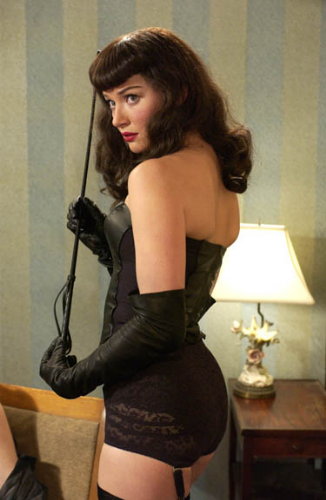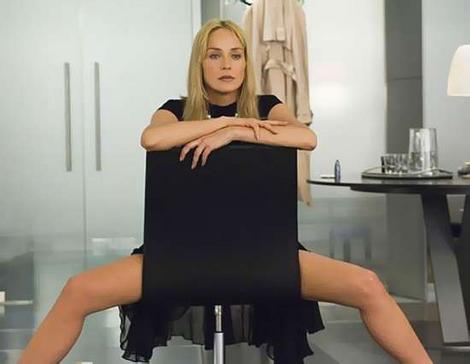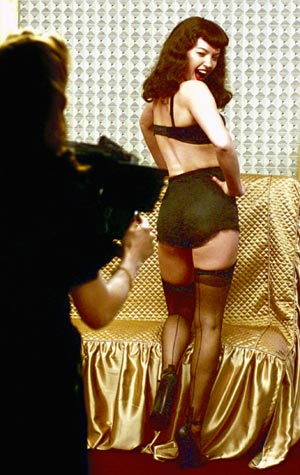From the Chicago Reader (April 21, 2006). — J.R.
The Notorious Bettie Page
*** (A must see)
Directed by Mary Harron
Written by Harron and Guinevere Turner
With Gretchen Mol, Chris Bauer, Jared Harris, Sarah Paulson, Cara Seymour, David Strathairn, Lili Taylor, and John Cullum
Basic Instinct 2
** (Worth seeing)
Directed by Michael Caton-Jones
Written by Leora Barish and Henry Bean
With Sharon Stone, David Morrissey, David Thewlis, Charlotte Rampling, Hugh Dancy, Flora Montgomery, Indira Varma, and Heathcoate Williams
The Notorious Bettie Page — about the pinup and soft-core-bondage film and magazine star of the 50s — mixes archival black-and-white and color footage with re-creations. The mix of materials evoking the period is far from seamless, and we can’t always be sure what’s archival and what’s simulated because sometimes the filmmakers are trying to fool us. But their preoccupation with the manufacture of images keeps this exercise in exposure and concealment interesting.
Page, effectively played by Gretchen Mol, is shown as a cheerful airhead who loves her work as a model and maintains a good-natured innocence about it. That is, until the puritanical Senate porn investigation of Estes Kefauver (whom David Strathairn makes almost interchangeable with his Edward R. Murrow in Good Night, and Good Luck) drives her back to the religion of her childhood, which the movie persuasively suggests was the only logical place for her to go at that point. Page, who’s still alive, eventually becomes a born-again Christian.
The film hints that Page, who grew up in Nashville, may have been the victim of family abuse, and it makes clear that she was gang-raped. But it tells us nothing about her sex life, before or after her return to religion, which is odd, given that director Mary Harron (I Shot Andy Warhol, American Psycho), who wrote the script with Guinevere Turner (Go Fish), wants to unpack 50s sexual ideology as well as revel in it.
The notion that Page, like Marilyn Monroe, was too ditzy to know what she was doing is more a mythological construct than an observation. As portrayed here, she knows nothing except that she’s attractive, and the only evidence that she’s capable of taking pleasure in sex is the delight she takes in posing. The filmmakers content themselves with a feminist deconstruction of those poses, perhaps because they know it won’t undermine her allure. Like good academics, they also want to come off as nonjudgmental and leave issues open-ended, and to some extent they succeed. Paradoxically they wind up objectifying Page almost as much as the porn industry did — except that now she’s the object of feminist theory instead of male lust.
Harron and Turner’s version of a sexpot is the opposite of Catherine Tramell (Sharon Stone), the sexpot in Basic Instinct (1992) and its recent sequel. She’s a phallic, brainy, and possibly murderous superwoman, though she’s as much the product of mythology and the puritanical imagination as Harron and Turner’s Page. It could be argued that both myths — the brainless sexpot and the sexpot genius — reflect a hysterical male response to female sexuality. One main difference is that Tramell knows she’s a fantasy and uses this knowledge to taunt her victims while happily screwing everyone in sight, women as well as men.
Both of these erotic fantasies depend on the stars being attractive to both sexes — though the overt lesbian activity of Tramell in Basic Instinct is downplayed in the sequel, most likely a response to lesbian protests against the earlier film. The Notorious Bettie Page isn’t particularly bold when it comes to bisexuality, but it does end with the sexually ambiguous Paula Klaw (Lili Taylor, who played Valerie Solanas in I Shot Andy Warhol), one of the two women porn photographers featured in the film, directing a lustful gaze at the Page porn she’s supposedly burning, then stealthily pocketing them.
I didn’t give any stars to Basic Instinct in 1992, but 11 years later I selected it as one of my 1,000 favorite films. Many aspects of it still look ridiculous: Paul Verhoeven’s postmodernist appropriation of ideas from Vertigo, Joe Eszterhas’s comic-book hyperbole that exploits a fear of feminism, Michael Douglas crowing about the fuck of the century, Sharon Stone playing Wonder Woman. But other aspects, such as Verhoeven’s and Stone’s baroque sense of style, now seem wonderful. Reviewers who say the sequel and Stone’s performance in it are high camp imply that the original was something else, but I can’t imagine what.
The commercial failure of the long-delayed sequel isn’t too surprising. It’s full of uncreative substitutions: London for San Francisco, a shrink with a checkered past (David Morrissey) for a cop with a checkered past, a belt for an ice pick. The filmmakers are clearly bored with this material, an attitude that isn’t obscured by the good secondary cast (Charlotte Rampling, David Thewlis), the decision to set the shrink’s office inside the phallic Swiss headquarters, or the mention of Jacques Lacan. They’re so bored they try to rewrite history by suggesting that the ability of desire to destroy professional and personal authority — the theme of The Blue Angel — is what made the original Basic Instinct a hit. In the original Douglas was a childish jerk-off from the get-go, and the plot was a duel of wills, dependent on the tension produced by not knowing whether Tramell was a killer. That’s hardly a scenario of masochistic abasement, but the sequel is: it ends with Tramell visiting the shrink in an asylum.
In Basic Instinct 2 Stone plays Tramell with as much style and relish as before, and that’s reason enough to see the film. Yet the response of some viewers has been more over-the-top than anything in the movie. Manohla Dargis in the New York Times called it a “prime object lesson in the degradation that can face Hollywood actresses, especially those over 40,” contrasting Stone’s performance here with her turn as Laura in last year’s Broken Flowers, where she was “luminous and touching…partly because the role called for her to act her age, and she happily complied.” I can’t fathom what’s degrading about Stone still being sexy at 47, but Dargis seems to be saying that Laura is past her sexual prime and therefore can be “luminous and touching,” whereas Catherine — who always has been and always will be a fantasy bitch goddess — is still in her prime and therefore can’t be even close to 47. That attitude would surely resonate with the teenage demographic.






